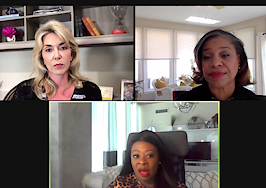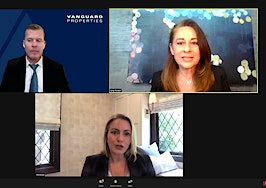 We want to help you make more money — right now. All month, go Back to Basics with Inman as real estate pros share what’s working now and how they’re setting up to profit in a post-pandemic world. Get full access to the series for 50 percent off here.
We want to help you make more money — right now. All month, go Back to Basics with Inman as real estate pros share what’s working now and how they’re setting up to profit in a post-pandemic world. Get full access to the series for 50 percent off here.
Being a new real estate agent in this fast-paced, red-hot market isn’t easy. Connections have always been important in this industry, but they matter now more than ever — so what’s a rookie to do?
If you’re a newly minted agent, you might be wondering where to start and how to cultivate those relationships with listing agents. Here are some best practices and ideas to build a strong network among real estate colleagues.
1. Read — and then read again
Listing agents get calls, emails and texts constantly. The agents who don’t check the multiple listing service (MLS) first before calling for something you’ve already added can frustrate listing agents.
So, make sure you read all the attached documents on the MLS. Read and follow the offer instructions, and also read the agent remarks. In a market where everyone is in a hurry, paying attention to these details will help you stand out. It also sends a message to the listing agent that you have your act together.
2. Reputation matters
Certain agents have a reputation for being difficult to deal with, combative and disorganized. As a new agent, you want to be the one who makes people say, “I loved working with you” or “I was so glad to see your name on this offer,” or “You were so professional; I can’t wait to do another deal together.”
This isn’t about being best friends — it’s about conducting yourself with integrity and honesty, creating win-win solutions, and being a professional.
On a deal I closed a few months back, an agent who was not from our market but was trying to sell here was extremely disorganized. My admin team and I were amazed at just how many things she was dropping the ball on, but the worst was when she sent a text to me she meant for her clients.
It was in a biting tone about a new listing I had in the same neighborhood and how it was “outrageously priced.” I replied, “I don’t think this was meant for me,” and she apologized profusely. It’s an easy mistake to make, and I told her I had a similar experience once, and it was all good. As a side note, I did end up selling that property for the price my seller wanted.
If you’re going to say something about another agent (that you don’t want that agent to read or know), perhaps keep it to yourself, and certainly do not put it in writing, whether via email or text. Unlike email, texting doesn’t have a delay or callback feature.
My own embarrassing and humbling moment: I sent an email once that I thought was going to my husband about a luxury video having too many drone shots. It felt like all the video included was the drone going up and down the façade of the house, and I wrote (it pains me to say this) that it “bored me to tears!”
I thought I sent this email to my husband, but it was actually to the listing agent. At the time, I didn’t have the callback feature on my email. (I do have it now!) To my credit, I had never sent an email like that before, and of course, this first time was a disaster. I was mortified. I started crying as soon as I realized what I had done.
I emailed the listing agent back after about 10 minutes and said, “I am so sorry for this email. Clearly, you’re the one with the incredible luxury listing, and I’m the newbie, so I am hardly one to critique your work. I hope you’ll forgive me?”
He sent a nice message back and was really gracious, but that stupid email still haunts me to this day. Thumper from Bambi had it right: “If you don’t have anything nice to say, don’t say anything at all.”
3. Be creative
There are the traditional terms of the offer, but there are also all kinds of ways to make your offer stand out. If your buyers are able to, perhaps offer a free leaseback to the sellers. What about offering to pay the sellers’ attorney fees or state excise tax (if you have this in your state)?
The regular terms of an offer are important, but showing your client’s flexibility and your creativity is worth real money in this market. Still, while being creative, make sure to follow all federal fair housing laws.
4. Read the contracts
I recently had a new agent tell me my sellers would have to fix items that were found on an inspection. In our state, homes are sold as is, per our contract. Sellers and buyers often negotiate repairs, and some loans are subject to repairs, but he was confusing disclosing material facts with doing repairs.
This is a massive difference, and in a nice way, I recommended he reread our 15-page contract to get more familiar with it. As a new agent, knowing the contract well and where certain things are located (like the all-important “delay in settlement”) is so critical.
The offer to purchase for agents is like the Constitution for lawyers — memorize it and use your knowledge of it to your and your client’s advantage. Confidence without competence is the ultimate sign of a rookie.
5. Leverage your leader’s existing relationships
If your team leader, broker in charge or manager has a relationship with the listing agent, they may be able to give you some pointers on how to best work with them.
If the relationship is great between your manager and the listing agent you are writing an offer for, it would be smart to let the listing agent know that even though you are new, you’re under the supervision of (your person), so they can rest easy you’ll have all the support you need for this to be a smooth transaction.
6. Be teachable and honest
If you don’t win the offer, when appropriate, ask the listing agents if they have any feedback for you to succeed in the future. They may not answer, but there’s a chance they might — and you never know what pearls of wisdom they could give you.
There’s another true story that happened to me not that long ago. I was the listing agent for a deal, and the buyer’s agent was an acquaintance from church. Due to the pandemic, I hadn’t seen him in forever, but I did know him.
This wasn’t a multiple-offer situation, but of course, it was still quite stressful. At one point, we needed to change the closing date and a credit for closing. In his newness, he rewrote the entire contract, not realizing we have an easy fix for that with an amendment.
I was puzzled by this at first, because re-signing a new contract made no sense, and I honestly wasn’t sure what the legal implications would be for my sellers, and I knew the lender would be even more confused.
After a text or two back and forth with the agent, he called me on the phone and said, “Honestly, I’m new at doing this. I mostly deal with rentals, and I’m not sure how to write this up.”
His refreshing honesty was all I needed to draft the document the right way and send it to my sellers, and then all he had to do was get his buyers to sign. He was grateful and learned how these things are done. I could’ve told him he should have known better or should have called his leader or manager, but we were new at one point, and showing a little graciousness to someone goes a long way. The golden rule is still golden.
7. Presentation counts
As a buyer’s agent, I’ve found that listing agents really love when I write an email that includes a recap of the offer and a recap of all the attachments. I also follow any offer instructions to a T — and you should too.
I use this time to highlight special features of the offer, including my buyer’s flexibility, and if the lender is local or how much my buyer is putting down, etc. If I’m offering a free leaseback, I write the entire lease, including pet addendums, to make sure the sellers know how serious the buyers are about this element.
Anything you can do to make the listing agent’s and sellers’ lives easier will have impact. Also, when there are multiple offers, consider choosing numbers that aren’t obvious. For example, instead of $10,000, try $10,200 or $10,555.
As a listing agent, sometimes, the smallest differences matter; $100 more in due diligence fees in one of my recent deals was what prompted the seller to choose my offer over another.
8. Go back to Basics
Please make sure your grammar, punctuation and spelling are correct. This sends a message that you’re a professional and that you pay attention to the details.
Do not send an offer via text message. Do not send an offer via text, in a multiple-offer situation, when you are “out duck-hunting and can’t get to a computer.” Do not send an offer that is incomplete or with the wrong sellers’ names (this really happened to me).
Take an extra five minutes, and go over your offer packet before you submit it. Do not call an escalation clause an escalator clause. Slowing down and paying attention will truly pay off.
9. Pick up the phone
Talking on the phone does wonders for relationships, especially new ones. You can easily misread people’s tone via email or texting, but you don’t have that issue when you can hear their voice.
You also get to hear background noises during phone calls, which can tell you a great deal about the listing agent. Perhaps they are at a sporting event and stepped away. You might hear a young child in the room, or figure out that they’re driving and offer to send them a recap of your questions via text instead (if that would help them).
On the phone, you can hear frustration or excitement, and even long pauses can tell you something that an emoji never can. You can build rapport and trust faster on a phone call than you’d ever be able to with a text or a string of emojis.
Being an agent others trust and like to work with is a reputation you earn over time. If you make a mistake, big or small, take responsibility. Slow down enough to check that your contract is filled out properly, the names are accurate, and your emails are well written.
If you work with an agent who is awesome, tell them how much you enjoyed working with them, give them a shoutout on social media, spread their good name throughout your office — and always remember the golden rule.
Stephanie Lanier is the founder and CEO of Lanier Property Group, a boutique real estate firm in Wilmington, North Carolina.






